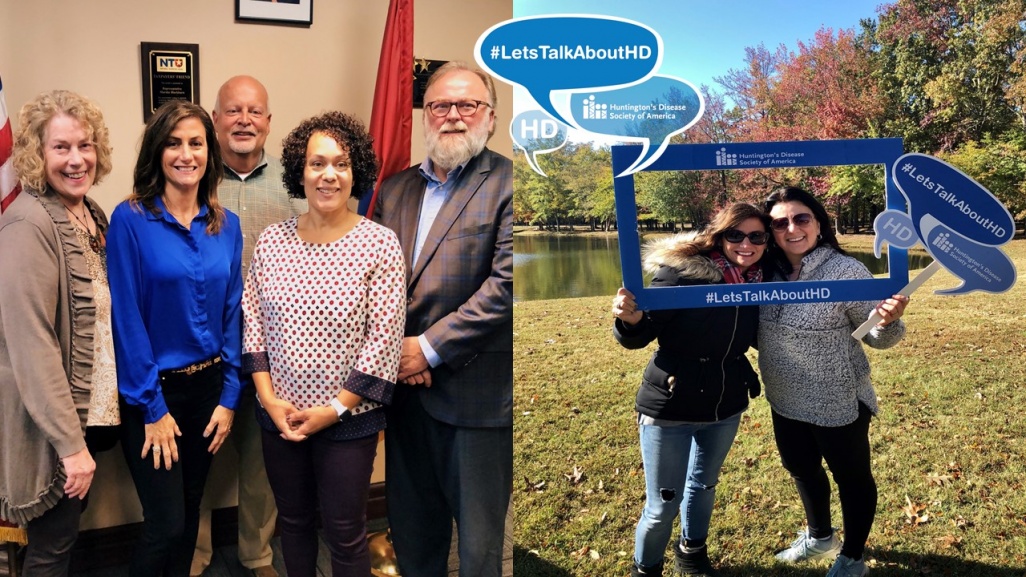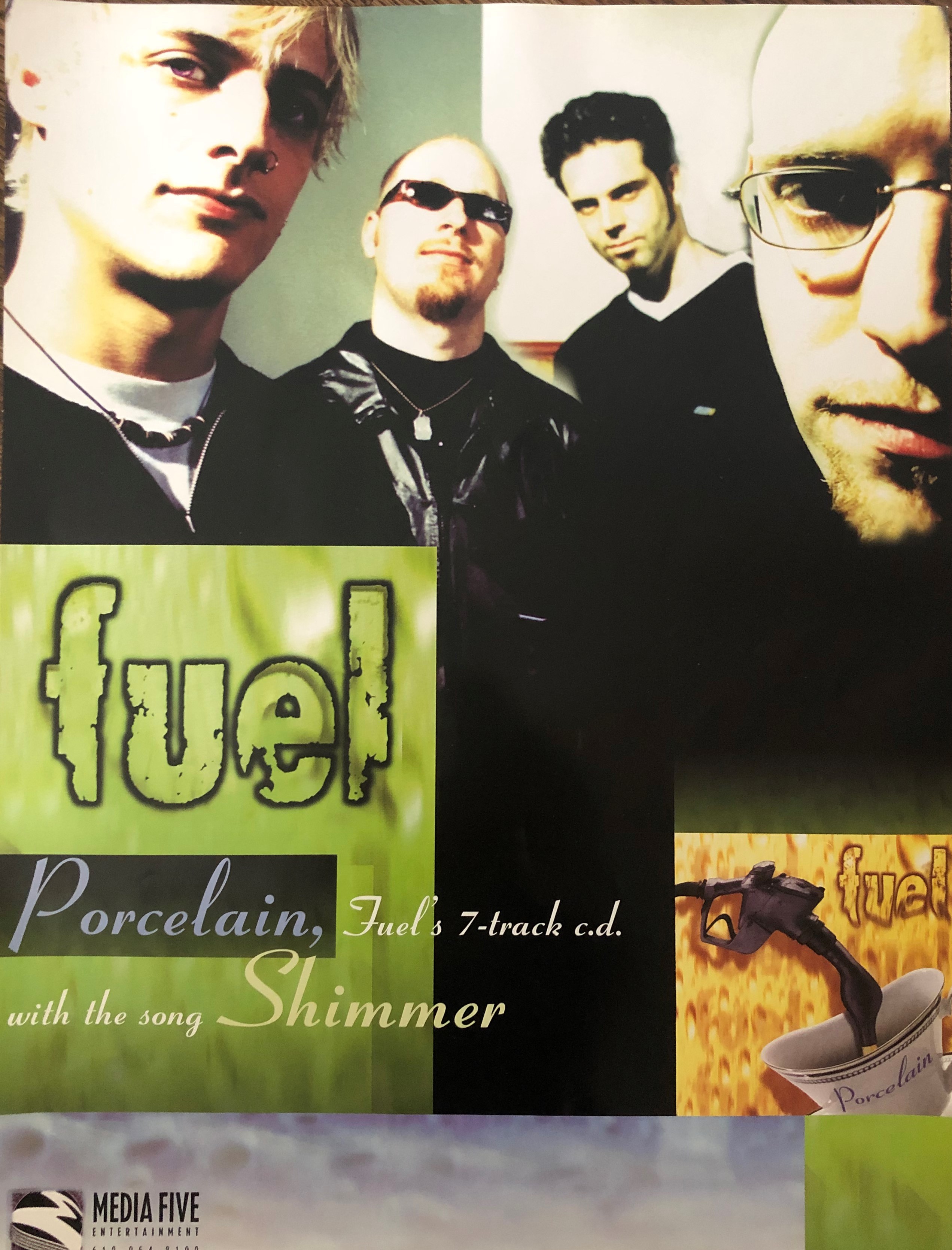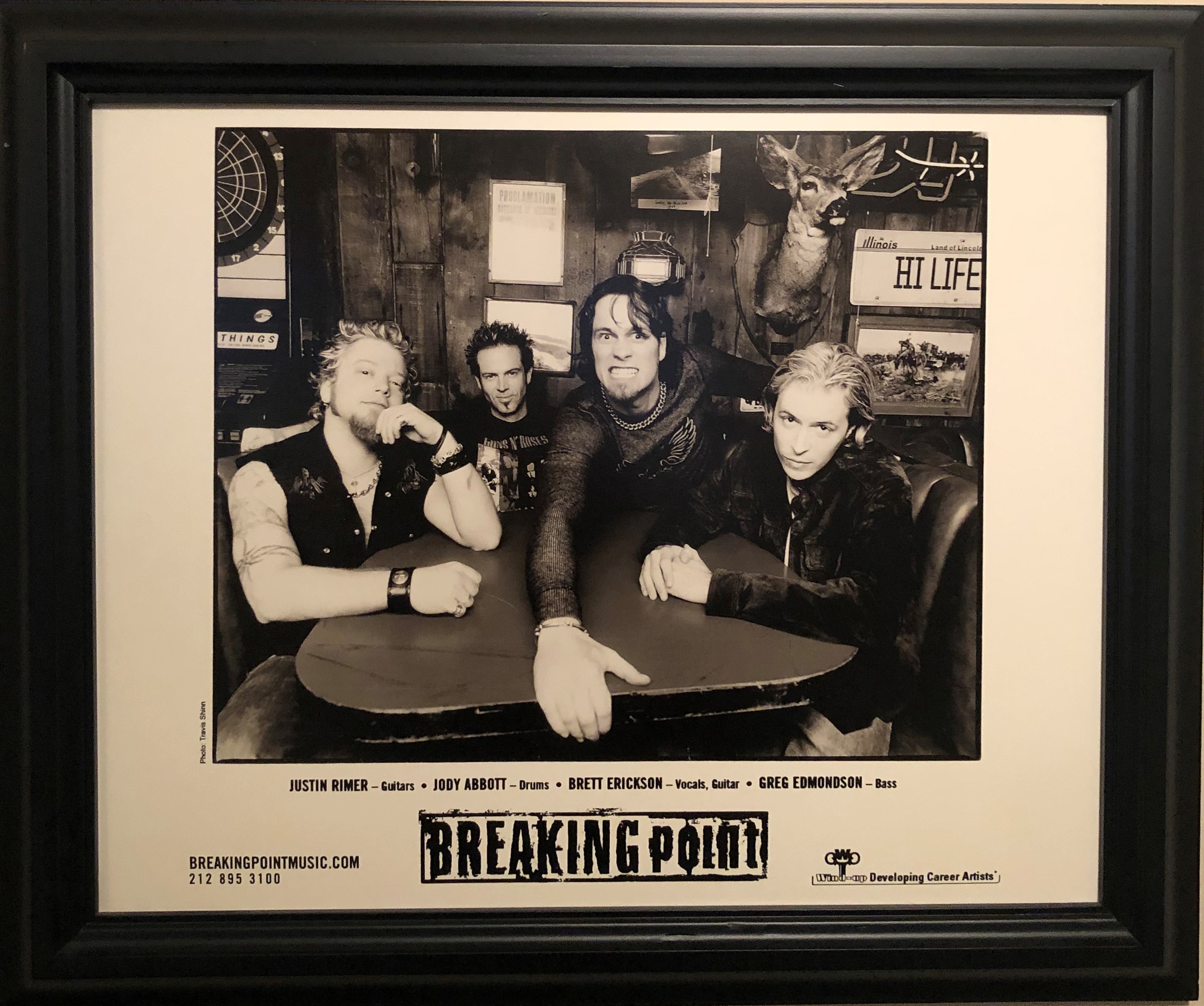
By Matthew Santamaria (msantamaria@hdsa.org)
In 1995, Amy and her friends wanted to go out and see a little-known band at the time called Fuel, a future multi-Platinum selling rock band. Jody Abbott was the lead drummer and connected with Amy. They would eventually marry as Jody’s career was taking off.


From 1994-1998, Jody was a part of four extended plays of Fuel including Small the Joy, Fuel, Porcelain, and Hazleton. One of their tracks “Shimmer” would top in the Billboard Hot 100.
After leaving Fuel, Jody joined another rock band called Breaking Point. The band released their first album in 2001 called Coming of Age. Their tracks were included in movies such as The Scorpion King, Dragon Ball Z: Lord Slug, and Dragon Ball Z: Cooler’s Revenge.

Wrestlers such as Rob Van Dam (ECW/WWE/TNA) and Kota Ibushi (New Japan Pro Wrestling) have used tracks as their theme song.
With all the success that Jody had in music, his family dealt with an inherited disease that could pass on to the next generation called Huntington’s disease (HD). This is a fatal genetic disorder that causes the progressive breakdown of nerve cells in the brain. It deteriorates a person’s physical and mental abilities usually during their prime working years and has no cure.
At the time, this was a disease that had little information. According to Amy, there was no genetic counseling available.
When Jody was younger, he remembers his grandmother, who suffered from HD, not being able to hold him and his siblings because her movement was so pronounced.
HD is described as having ALS, Parkinson’s and Alzheimer’s diseases – simultaneously. Symptoms include personality changes, mood swings, depression, forgetfulness, impaired judgement, unsteady gait, involuntary movements, slurred speech, difficulty in swallowing, and significant weight loss.
His father would eventually develop symptoms and passed away during Thanksgiving weekend. Jody’s sister, Melinda, is ten years older than Jody. Melinda has started to develop coria problems and has not driven a car in fifteen years. She has been confined to the house.
Jody and Amy own a Payday & Title loan business. His brother Jim was also in the same business and was not making good choices financially as his symptoms progressed. Amy and Jody moved Jim from Texas to Tennessee so he was closer to family and bought his failing business to help him financially stay afloat.
In 2013, Jim was diagnosed with HD as he was developing impaired judgement, paranoia, and hallucinations. He would later take his own life.
Jody was told in a neurologist appointment that he tested positive for HD. At the time, Jody was dealing with the loss of his brother and mother. He did not process this well as he was developing more mood swings.
The decision to get genetically tested is difficult to make. Each year, 5-10% are tested. It is never the right or wrong decision to be tested. There are people that see no benefit in knowing that they will develop the disease while others want to know in order to make informed choices about their future. It can take up to several weeks to receive your results from the genetic testing center.
Jody’s daughter and son are now at risk for HD. Every child of a parent with HD has a 50/50 chance of inheriting the faulty gene that causes Huntington’s disease.
Because of Jody testing positive, and seeing his brother almost loose his business, he made a good business decision and legally put their own business and finances into only Amy’s name. They have also secured their assets in a Trust.
According to Amy, some days are better than others. Amy got Jody a new walker that is designed for Parkinson’s disease patients.
The family is very vocal about the disease and both children want to be tested. They are also involved in the Tennessee Community as Amy feels there is a stigma to the disease, and we need to show people that nobody is alone in this fight. She also encourages people to go to your local HDSA Centers of Excellence, provide an elite team approach to HD care and research. Professionals have extensive experience working with families affected by HD and work together to provide families the best HD care program.
###
Huntington’s disease is a fatal genetic disorder that causes the progressive breakdown of nerve cells in the brain. It deteriorates a person’s physical and mental abilities usually during their prime working years and has no cure. Every child of a parent with HD has a 50/50 chance of inheriting the faulty gene that causes Huntington’s disease. Today, there are approximately 41,000 symptomatic Americans and 200,000 at-risk of inheriting the disease. In less than 10% of cases, juvenile Huntington’s disease (JHD) affects children & adolescents. JHD usually has a more rapid progression rate than adult onset HD; the earlier the onset, the faster JHD progresses. HD is described as having ALS, Parkinson’s and Alzheimer’s diseases – simultaneously. HD is characterized by a triad of symptoms, including progressive motor dysfunction, behavioral disturbance and cognitive decline.
The Huntington’s Disease Society of America is the premier nonprofit organization dedicated to improving the lives of everyone affected by HD. From community services and education to advocacy and research, HDSA is the world’s leader in providing help for today and hope for tomorrow for people with HD and their families.
To learn more about Huntington’s disease and the work of the Huntington’s Disease Society of America, visit www.HDSA.org or call 1(800)345-HDSA.
This is a story featuring a personal experience with Huntington’s disease. If you would like to have your story told please contact Matthew Santamaria at msantamaria@hdsa.org
In 1995, Amy and her friends wanted to go out and see a little-known band at the time called Fuel, a future multi-Platinum selling rock band. Jody Abbott was the lead drummer and connected with Amy. They would eventually marry as Jody’s career was taking off.


From 1994-1998, Jody was a part of four extended plays of Fuel including Small the Joy, Fuel, Porcelain, and Hazleton. One of their tracks “Shimmer” would top in the Billboard Hot 100.
After leaving Fuel, Jody joined another rock band called Breaking Point. The band released their first album in 2001 called Coming of Age. Their tracks were included in movies such as The Scorpion King, Dragon Ball Z: Lord Slug, and Dragon Ball Z: Cooler’s Revenge.

Wrestlers such as Rob Van Dam (ECW/WWE/TNA) and Kota Ibushi (New Japan Pro Wrestling) have used tracks as their theme song.
With all the success that Jody had in music, his family dealt with an inherited disease that could pass on to the next generation called Huntington’s disease (HD). This is a fatal genetic disorder that causes the progressive breakdown of nerve cells in the brain. It deteriorates a person’s physical and mental abilities usually during their prime working years and has no cure.
At the time, this was a disease that had little information. According to Amy, there was no genetic counseling available.
When Jody was younger, he remembers his grandmother, who suffered from HD, not being able to hold him and his siblings because her movement was so pronounced.
HD is described as having ALS, Parkinson’s and Alzheimer’s diseases – simultaneously. Symptoms include personality changes, mood swings, depression, forgetfulness, impaired judgement, unsteady gait, involuntary movements, slurred speech, difficulty in swallowing, and significant weight loss.
His father would eventually develop symptoms and passed away during Thanksgiving weekend. Jody’s sister, Melinda, is ten years older than Jody. Melinda has started to develop coria problems and has not driven a car in fifteen years. She has been confined to the house.
Jody and Amy own a Payday & Title loan business. His brother Jim was also in the same business and was not making good choices financially as his symptoms progressed. Amy and Jody moved Jim from Texas to Tennessee so he was closer to family and bought his failing business to help him financially stay afloat.
In 2013, Jim was diagnosed with HD as he was developing impaired judgement, paranoia, and hallucinations. He would later take his own life.
Jody was told in a neurologist appointment that he tested positive for HD. At the time, Jody was dealing with the loss of his brother and mother. He did not process this well as he was developing more mood swings.
The decision to get genetically tested is difficult to make. Each year, 5-10% are tested. It is never the right or wrong decision to be tested. There are people that see no benefit in knowing that they will develop the disease while others want to know in order to make informed choices about their future. It can take up to several weeks to receive your results from the genetic testing center.
Jody’s daughter and son are now at risk for HD. Every child of a parent with HD has a 50/50 chance of inheriting the faulty gene that causes Huntington’s disease.
Because of Jody testing positive, and seeing his brother almost loose his business, he made a good business decision and legally put their own business and finances into only Amy’s name. They have also secured their assets in a Trust.
According to Amy, some days are better than others. Amy got Jody a new walker that is designed for Parkinson’s disease patients.
The family is very vocal about the disease and both children want to be tested. They are also involved in the Tennessee Community as Amy feels there is a stigma to the disease, and we need to show people that nobody is alone in this fight. She also encourages people to go to your local HDSA Centers of Excellence, provide an elite team approach to HD care and research. Professionals have extensive experience working with families affected by HD and work together to provide families the best HD care program.
Amy has a message for the HD Community:
“Be involved in your community. Seek out a support group. Volunteer for a fundraiser. There is so much knowledge out there and it is important to talk to people who have lived through this. They can commiserate, understand and offer support in times of need. I learn something new every time I attend an HD event, visit Jody’s neurologist, or attend a support group meeting.”
“Be involved in your community. Seek out a support group. Volunteer for a fundraiser. There is so much knowledge out there and it is important to talk to people who have lived through this. They can commiserate, understand and offer support in times of need. I learn something new every time I attend an HD event, visit Jody’s neurologist, or attend a support group meeting.”
###
Huntington’s disease is a fatal genetic disorder that causes the progressive breakdown of nerve cells in the brain. It deteriorates a person’s physical and mental abilities usually during their prime working years and has no cure. Every child of a parent with HD has a 50/50 chance of inheriting the faulty gene that causes Huntington’s disease. Today, there are approximately 41,000 symptomatic Americans and 200,000 at-risk of inheriting the disease. In less than 10% of cases, juvenile Huntington’s disease (JHD) affects children & adolescents. JHD usually has a more rapid progression rate than adult onset HD; the earlier the onset, the faster JHD progresses. HD is described as having ALS, Parkinson’s and Alzheimer’s diseases – simultaneously. HD is characterized by a triad of symptoms, including progressive motor dysfunction, behavioral disturbance and cognitive decline.
The Huntington’s Disease Society of America is the premier nonprofit organization dedicated to improving the lives of everyone affected by HD. From community services and education to advocacy and research, HDSA is the world’s leader in providing help for today and hope for tomorrow for people with HD and their families.
To learn more about Huntington’s disease and the work of the Huntington’s Disease Society of America, visit www.HDSA.org or call 1(800)345-HDSA.
This is a story featuring a personal experience with Huntington’s disease. If you would like to have your story told please contact Matthew Santamaria at msantamaria@hdsa.org
